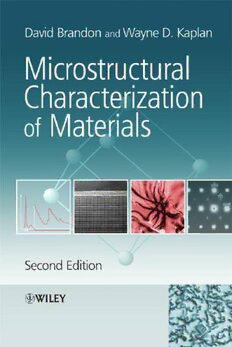Download Microstructural Characterization of Materials PDF Free - Full Version
Download Microstructural Characterization of Materials by David Brandon, Wayne D. Kaplan in PDF format completely FREE. No registration required, no payment needed. Get instant access to this valuable resource on PDFdrive.to!
About Microstructural Characterization of Materials
Microstructural characterization is usually achieved by allowing some form of probe to interact with a carefully prepared specimen. The most commonly used probes are visible light, X-ray radiation, a high-energy electron beam, or a sharp, flexible needle. These four types of probe form the basis for optical microscopy, X-ray diffraction, electron microscopy, and scanning probe microscopy.Microstructural Characterization of Materials, 2nd Edition is an introduction to the expertise involved in assessing the microstructure of engineering materials and to the experimental methods used for this purpose. Similar to the first edition, this 2nd edition explores the methodology of materials characterization under the three headings of crystal structure, microstructural morphology, and microanalysis. The principal methods of characterization, including diffraction analysis, optical microscopy, electron microscopy, and chemical microanalytical techniques are treated both qualitatively and quantitatively. An additional chapter has been added to the new edition to cover surface probe microscopy, and there are new sections on digital image recording and analysis, orientation imaging microscopy, focused ion-beam instruments, atom-probe microscopy, and 3-D image reconstruction. As well as being fully updated, this second edition also includes revised and expanded examples and exercises, with a solutions manual available at http://develop.wiley.co.uk/microstructural2e/ Microstructural Characterization of Materials, 2nd Edition will appeal to senior undergraduate and graduate students of material science, materials engineering, and materials chemistry, as well as to qualified engineers and more advanced researchers, who?will find the book a useful and comprehensive general reference source.
Detailed Information
| Author: | David Brandon, Wayne D. Kaplan |
|---|---|
| Publication Year: | 2008 |
| ISBN: | 470727128 |
| Pages: | 554 |
| Language: | English |
| File Size: | 13.753 |
| Format: | |
| Price: | FREE |
Safe & Secure Download - No registration required
Why Choose PDFdrive for Your Free Microstructural Characterization of Materials Download?
- 100% Free: No hidden fees or subscriptions required for one book every day.
- No Registration: Immediate access is available without creating accounts for one book every day.
- Safe and Secure: Clean downloads without malware or viruses
- Multiple Formats: PDF, MOBI, Mpub,... optimized for all devices
- Educational Resource: Supporting knowledge sharing and learning
Frequently Asked Questions
Is it really free to download Microstructural Characterization of Materials PDF?
Yes, on https://PDFdrive.to you can download Microstructural Characterization of Materials by David Brandon, Wayne D. Kaplan completely free. We don't require any payment, subscription, or registration to access this PDF file. For 3 books every day.
How can I read Microstructural Characterization of Materials on my mobile device?
After downloading Microstructural Characterization of Materials PDF, you can open it with any PDF reader app on your phone or tablet. We recommend using Adobe Acrobat Reader, Apple Books, or Google Play Books for the best reading experience.
Is this the full version of Microstructural Characterization of Materials?
Yes, this is the complete PDF version of Microstructural Characterization of Materials by David Brandon, Wayne D. Kaplan. You will be able to read the entire content as in the printed version without missing any pages.
Is it legal to download Microstructural Characterization of Materials PDF for free?
https://PDFdrive.to provides links to free educational resources available online. We do not store any files on our servers. Please be aware of copyright laws in your country before downloading.
The materials shared are intended for research, educational, and personal use in accordance with fair use principles.

